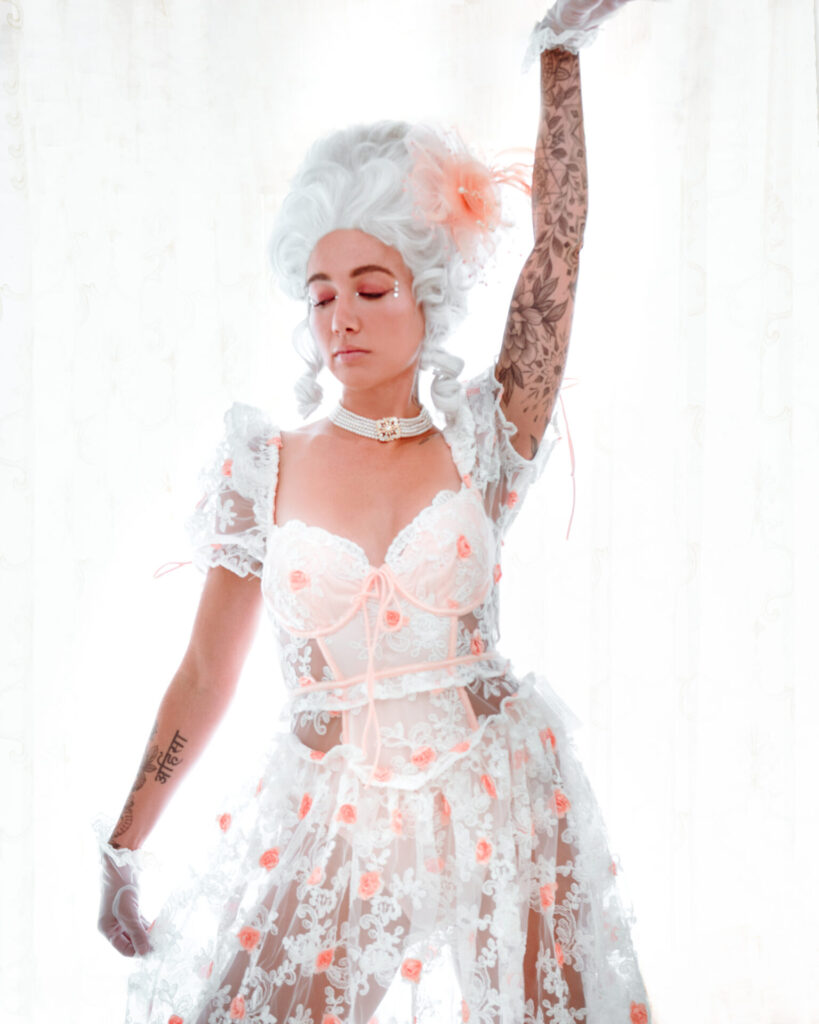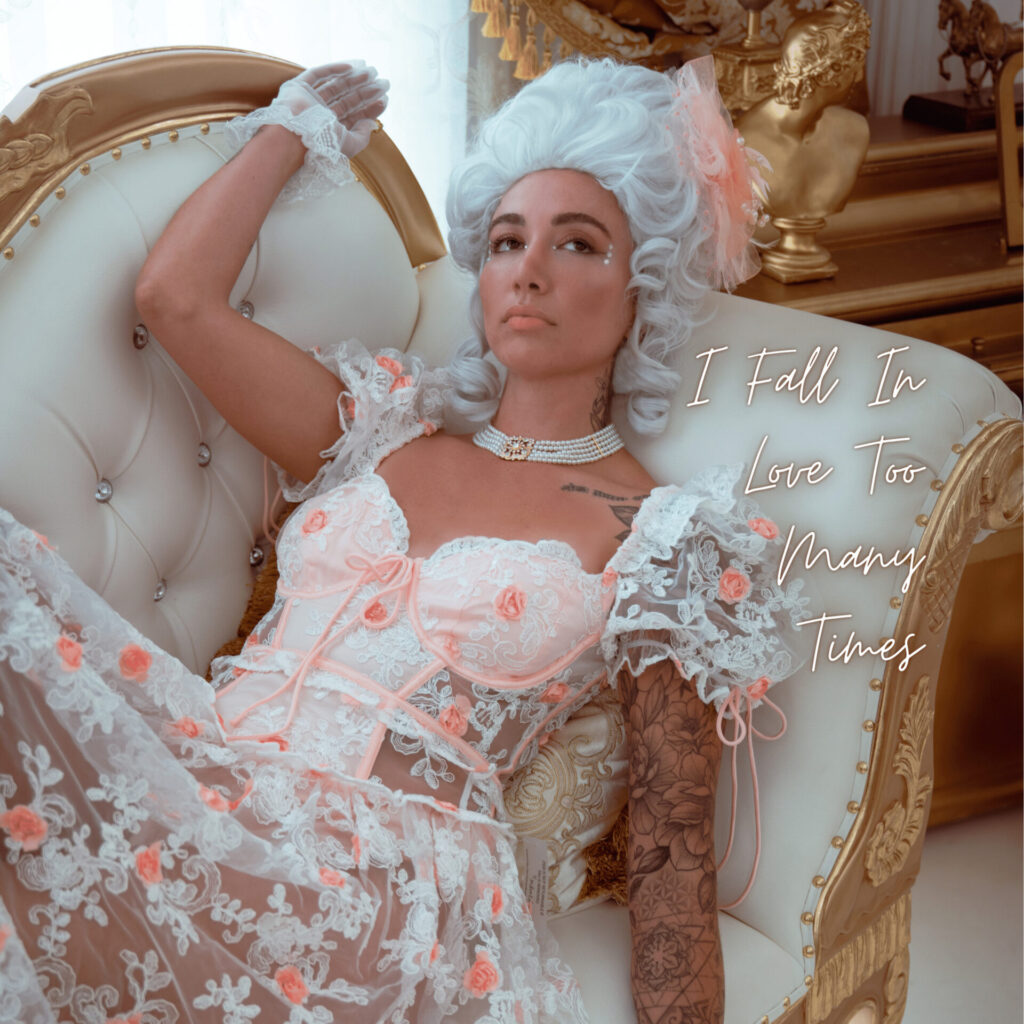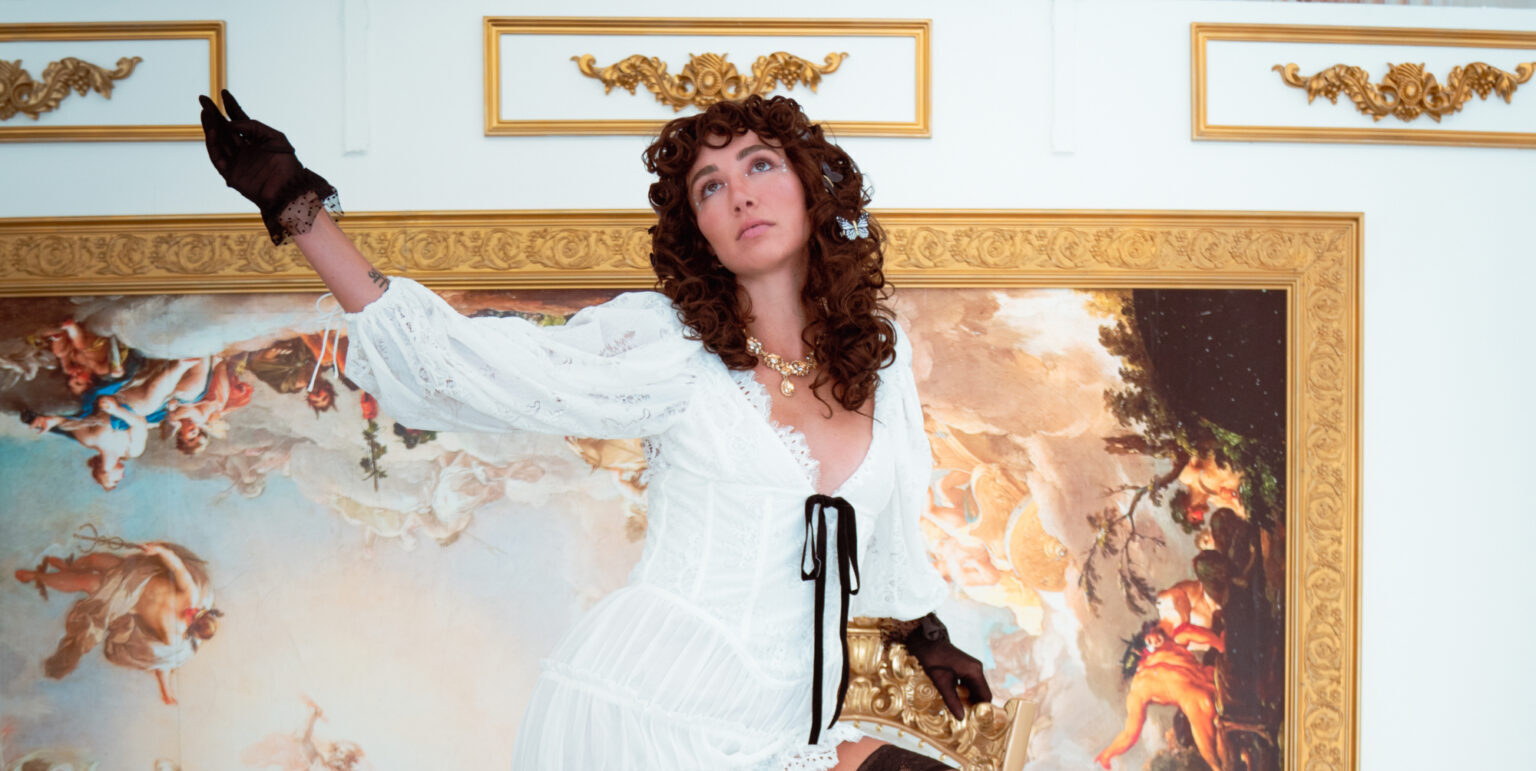ARO is a young artist who has released the alternative pop confessional titled “I Fall in Love Too Many Times.” Electric guitar chords played with melancholy are used to connect the melody, and the beat changes to a smooth dancehall beat. Her relationship with her own neurodivergence is examined in this piece, which also makes reference to the typical cycle of hyper-fixation and burnout. She discusses her internal conflicts while grudgingly acknowledging the development they bring. In the closing chorus, she begs for peace for the subsequent version of herself, saying, “A thousand deaths aren’t enough, attend them all while I become the enemy of my future self.” Check out the exclusive interview below:

1. Can you tell us a bit about where you come from and how it all got started?
ARO: I grew up with parents in the military, so I moved quite often. The place we stayed the longest in my childhood was a small town in rural Pennsylvania. I finished high school there and went to college in Philadelphia. After school a lot of my life was up in the air, I hated the corporate world so I jumped jobs a lot until eventually deciding to work for myself. I also moved a lot in my early 20’s. I don’t think I actually finished an apartment lease until I was 26. I resented this idea that one day we’re just supposed to grow up and get on the ladder of life you know, checking off the boxes, doing the things. I gave myself a lot of freedom to take risks and make mistakes. I’ve often chosen chaos over comfort because at least I felt alive there. And as I’ve gotten older I’ve found a steady hand in my risk taking, knowing when to jump vs knowing when to wait. I don’t think I would’ve gotten to this point where I’m allowing myself to pursue music so freely if I hadn’t allowed myself this kind of freedom throughout my 20s. I think those of us who choose a less linear lifestyle can look back and see how everything that seemed completely random and unrelated at the time actually was building to something bigger that we couldn’t see in the future yet. I had always wanted to make music, but it seemed like a ridiculous idea in my head, and I had all these reasons why it was ridiculous, until one day I decided it wasn’t and here we are.
2. Did you have any formal training or are you self-taught?
ARO: I am completely self taught when it comes to songwriting and up until just a few months ago I was self taught with singing as well. I spent about a year learning from vocal instructors on YouTube and practicing every single day. I reached a point where I felt like I had learned about as much as I could on my own and decided to invest in a vocal coach, so now I do feel like I’m getting so much out of my lesson time because I’ve put a lot of time in myself and know my weak points. As a kid I played the clarinet, flute and piano and earlier this year I picked up the guitar with a few lessons from my mom. I’m very rusty with reading music though and probably should invest some time in learning a bit of music theory.
3. Who were your first and strongest musical influences and why the name ‘ARO?
ARO: When I was really young I loved all the pop icons of the time, I told my mom I wanted to be Britney Spears when I grew up lol. As I grew up I started recognizing a lot of sexism in popular music. I didn’t have the language to describe that that’s what I was noticing. There was a lot of objectification and even violence condoned towards women in popular music in the early 00’s. I also noticed the ways that women were often excluded from genres back then. Again I didn’t have the language to talk about any of this but I felt it and I was resentful of it. So I went through a phase for a couple of years where I was boycotting pretty much all music of that time lol. I got into a lot of music from the 70’s and 80’s, a lot of rock from those decades. Artists like Fleetwood Mac, Tom Petty, Pat Benatar, I was really into older music for a while and all of the artists from that time shaped a lot of my music taste. When it came time to pick what name I’d be performing under I initially wanted to perform under my middle name Elizabeth, I was gonna do something funky with two z’s or whatever lol. But turns out there are a lot of Elizabeth’s out there on Spotify under various spellings. I ultimately landed on ARO because it’s my last name and it sounds cool.
4. What’s your view on the role and function of music as political, cultural, spiritual, and/or social vehicles – and do you try and affront any of these themes in your work, or are you purely interested in music as an expression of technical artistry, personal narrative, and entertainment?
ARO: To me art is about authenticity, really doing the work of knowing who you are and having the courage to express that fully. I think there are incredible artists whose purpose is that they’re purely here to entertain and make people feel good without necessarily carrying a deeper/heavier message. I also think there are incredible artists whose purpose is to dig deeper, asking more provocative questions about our existing constructs. I think when we gatekeep art or create hierarchies we lose the brilliance of a lot of art. For me, my purpose as an artist is to make people feel. My work is a direct reflection of my inner world and processes. I like to dive into the sticky stuff without the need to make it clean and nice, more emphasis on real than neat. And I like to deliver it in ways that are thought provoking. At the end of the day I just want people to feel alive in some way when engaging with my work.

5. Do you feel that your music is giving you back just as much fulfillment as the amount of work you are putting into it or are you expecting something more, or different in the future?
ARO:
I actually talk about this all the time. Music is the first thing in my life that is giving back to me as much personal fulfillment as the amount of work that I pour into it. It’s been a process of getting to know myself better and better. Even when it feels hard and confronting I have the opportunity to go deeper with myself. I honestly only expect that back and forth to get better with time.
6. Could you describe your creative processes? How do usually start, and go about shaping ideas into a completed song? Do you usually start with a tune, a beat, or a narrative in your head? And do you collaborate with others in this process?
ARO:
All the above. I don’t have one streamlined process for song writing. I’m self taught and I actually think that’s given me a bit of an advantage, no one ever told me like this is the right way to do things. It’s been a lot of trial and error, and routinely I find I get my favorite work when I follow whatever string of inspiration is dangling in front of my face at a given moment. That could be a vague feeling that I dive deeper into, it could be imagery that pulled at something in me and I might unpack that, it could be a particular sound that lit me up in a certain way, it could be me just writing stream of consciousness that I’ll then clean up and turn into something more cohesive. Once I have something to grip onto I’ll start a back and forth between a beat and lyric writing and just ride that out until I have something that I like that I’m singing over and over again in my head throughout the day. I know if I’ve got it stuck in my head that it’s probably worth writing through to the end of the song to see if it’s something I want to eventually produce. But it’s probably worth noting that a big part of this learning process for me has been understanding that not everything I pour time into is going to eventually be work I put out there, and that’s a good thing. It gives me freedom to just make shitty art sometimes, and that’s part of the process.
7. What has been the most difficult thing you’ve had to endure in your life or music career so far?
ARO: (TW: rape) I don’t like to say I’ve had a “hard” life necessarily, sometimes it feels too dramatic. But the more healing work I do on myself the more I can recognize that there are things in my life that I never should have had to experience. When I was 18 I was drugged and raped at a college frat party. It was a hard thing to wrap my head around at the time, I actually didn’t think of it as assault for a while because it was just too hard to accept. I blamed myself a lot for it and never reported the guy who did it. I saw him around campus all the time and even had one class with him. I developed PTSD but again it took me a long time to call it that. I was really trying to strong arm normalcy in my life. But in not admitting that I needed help I absolutely ran myself into the ground trying to be “ok”. My mental health completely spiraled. I wasn’t eating or sleeping, I was over exercising, I was wreaking havoc in my personal relationships, I was drinking a lot, and I had absolutely no self esteem. I’ve dealt with hard things in my life, but this was probably the one single event that just completely capsized me. The healing process has been really non-linear and I’ve had to learn to accept that and be patient with myself. I’ve come really far and I’m healthier than I ever have been, but there are ways that it still affects my life sometimes. I don’t think there’s any real silver lining in stuff like this, but I will say that I really don’t fear much in life anymore. Something happens when you’ve been at rock bottom, where it feels like you’ve lost everything, and you slowly crawl yourself back up. It’s like I’ve already seen hell, I’ve made friends with loneliness, life can get me down but I’m not really afraid of anything anymore. And I do think that that feeling in particular is what allows me to share and promote myself so freely.
8. On the contrary, what would you consider a successful, proud or significant point in your life or music career so far?
ARO: I’ve had a lot of really proud moments for myself over the last few years. Going back to therapy 3 years ago is one that I’m particularly proud of. I had so many excuses for not going back to therapy, I was doing well enough, my life was stable, it was expensive, it was uncomfortable. I was also one of those people who was like “smarter” than my therapists, I didn’t think they’d tell me anything I didn’t already know about myself. But I went anyway and it was the best decision of my life. Now I’m such an advocate for getting mental health support, I really think everyone no matter their circumstances can benefit from it.
9. With social media having a heavy impact on our lives and the music business in general, how do you handle criticism, haters, and/or naysayers in general? Is it something you pay attention to, or simply ignore?
ARO: I operate under the belief that what people think about me is really none of my business and ultimately has nothing to do with me. It’s easier said than done for sure. But when I find myself getting pulled into someone else’s narrative of me I try to stop and first think about whether or not I’m acting in alignment with myself and my own values, and if the answer is yes then I try to think about what the narrative is actually saying about them. When people are rude for no reason it’s usually coming from a place of insecurity, they’re telling on themselves. And once I can ground in that reality it’s easier to just move on with my day.
10. Do you think is it important for fans of your music to understand the real story and message driving each of your songs, or do you think everyone should be free to interpret your songs in their own personal way?
ARO: Selfishly there is a small part of me that kind of wants people to see me through my work and understand something about me. But also I think it’s totally normal and good for everyone to have their own interpretation and experience of art. It’s inevitable. It’s going to strike a chord in everyone in a slightly different way depending on their own life experience and I think that’s beautiful.
KEEP IN TOUCH:
INSTAGRAM | SPOTIFY | TIKTOK | WEBSITE | YOUTUBE


